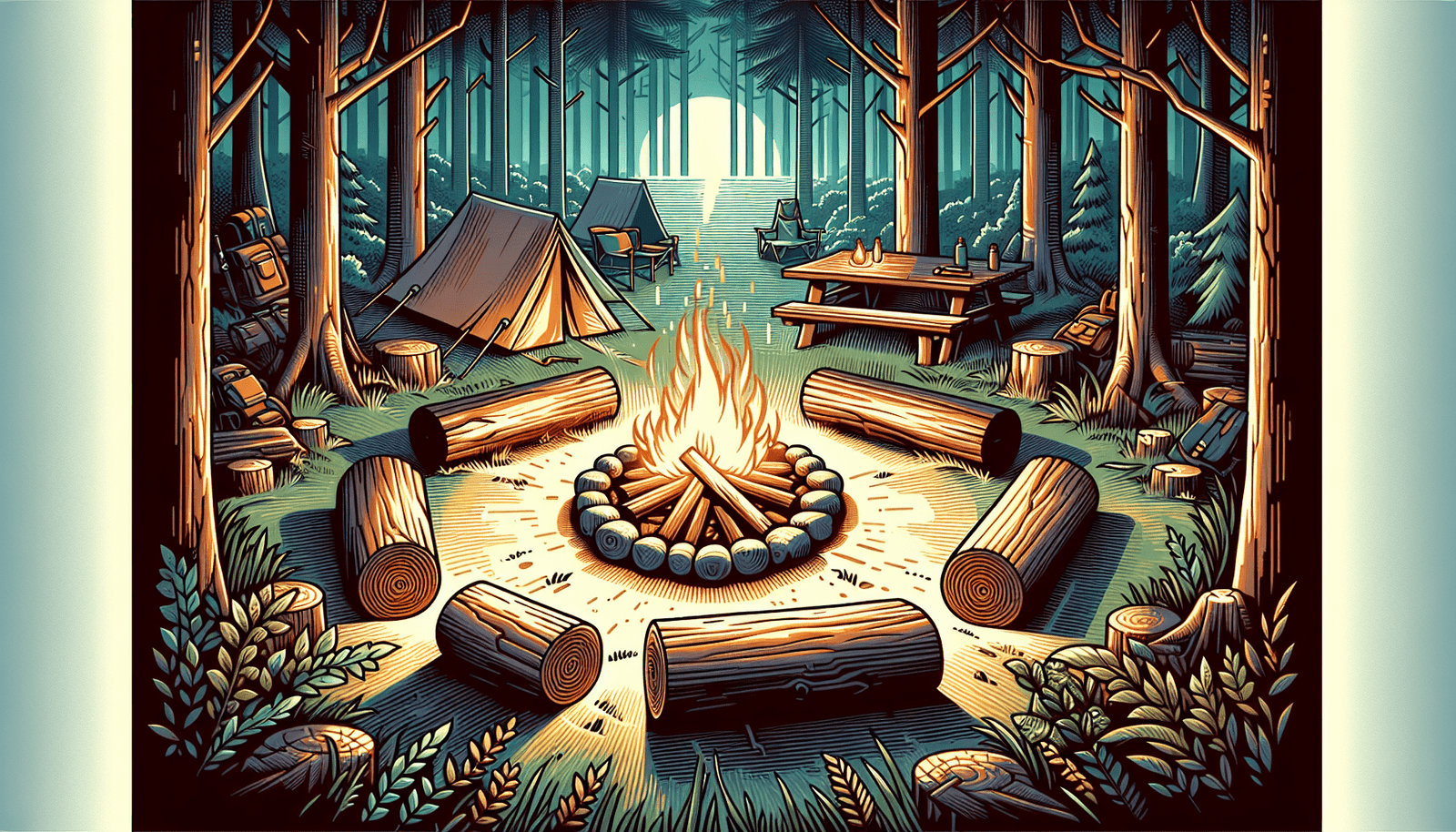Welcome to your adventure into the world of camps! In this captivating article, “What Happens In A Camp?” you’ll discover the magic that unfolds when you step into the great outdoors. Imagine waking up to the gentle rustle of leaves, the smell of breakfast cooking over an open fire, and the sound of laughter echoing through the trees. You’ll join in on thrilling activities like hiking, swimming, and stargazing, while also forging new friendships and learning valuable skills. So, grab your gear and get ready to experience the excitement and wonder that await you at camp!
What Happens In A Camp?

Introduction
Have you ever wondered what happens in a camp? Whether it’s your first time considering a camping experience or you’re reminiscing about past adventures, understanding the dynamics of a camp can help you appreciate the unique blend of fun, education, and camaraderie that camps offer.
The Arrival: Setting the Stage
Arrival Day
Your camp experience generally starts with arrival day. This is the day you step into a world different from your everyday life. You’ll be greeted by friendly faces, and the excitement will be palpable as campers, old and new, start their adventure.
Camp Registration
Upon arrival, you’ll typically go through a registration process. Here, camp staff will verify your information, collect any required forms, and provide you with essential items like name tags or camp t-shirts. This process helps ensure that everyone is accounted for and starts the journey on the right foot.
Cabin Assignments
Most camps assign living quarters where you’ll stay during your time at camp. These could be cabins, tents, or dormitories depending on the type of camp. You’ll meet your cabin mates and counselors, who’ll quickly become your home-away-from-home family.
Daily Activities: A Blend of Fun and Learning
Organized Activities
With a structured schedule filled with diverse activities, camps offer something for everyone. Whether it’s arts and crafts, sports, or science experiments, each activity is designed to challenge your mind and body while having fun.
Outdoor Adventures
Many camps emphasize outdoor activities. You might find yourself hiking through a forest, paddling a canoe on a serene lake, or navigating an obstacle course. These activities help you connect with nature and develop a sense of adventure and resilience.
Educational Workshops
Learning takes a front seat at many camps. Workshops on various subjects—such as environmental science, history, and even cooking—can inspire curiosity and lifelong learning. These sessions are usually hands-on, making education an experiential and engaging process.
Building Relationships: Friendship and Teamwork
Ice-Breaker Games
Ice-breaker games are designed to help you get to know your fellow campers. These games are a fun and informal way to break down barriers and form initial connections. Whether it’s a goofy relay race or a name game, you’ll quickly find yourself making new friends.
Team Building Activities
Collaborative exercises like group challenges and problem-solving tasks help foster teamwork. You’ll learn the value of cooperation and collective effort as you work together to achieve common goals. By the end of these activities, you’ll have developed a strong sense of camaraderie with your peers.
Campfires and Storytelling
One of the most cherished traditions in many camps is the evening campfire. Gathered around the warmth of the fire, you’ll share stories, sing songs, and reflect on the day’s experiences. This shared time under the stars builds a sense of community and creates lasting memories.
Skill Development: Personal Growth
Leadership Skills
Many camps focus on developing leadership qualities. Through activities that require initiative, decision-making, and responsibility, you’ll hone essential leadership skills that will serve you both inside and outside the camp environment.
Independence
Camp life naturally encourages independence. From managing your daily schedule to taking care of personal belongings, you’ll learn to be self-reliant. This newfound independence often translates into increased self-confidence and a sense of accomplishment.
Conflict Resolution
Living in close quarters with others can sometimes lead to conflicts. Camps offer a safe environment to learn conflict resolution skills. Counselors often guide campers through resolving disagreements, teaching valuable lessons in empathy, communication, and compromise.
Health and Wellness: Vital Aspects of Camp Life
Physical Activity
With a plethora of physical activities, camps ensure that you stay active. From swimming to hiking to sports, these activities promote physical health. The structure of the day balances exertion with rest, ensuring you remain energized throughout your stay.
Nutritious Meals
Camp menus typically offer a variety of nutritious meals to keep you fueled for your daily adventures. Meals are often communal, providing a great opportunity to bond with fellow campers while savoring delicious, healthy food.
Mental Health Support
Camps are increasingly recognizing the importance of mental well-being. Trained counselors are available for support, and many camps incorporate mindfulness and relaxation sessions. This holistic approach ensures you return home feeling mentally refreshed.

Special Themes and Programs: Tailoring the Experience
Themed Camps
Some camps specialize in specific themes, like sports camps, music camps, or tech camps. These camps focus on developing particular skills and knowledge, providing a more tailored experience. If you have a specific interest, a themed camp can be a fantastic way to dive deep into that subject.
Overnight vs. Day Camps
Camps come in different formats, including overnight and day camps. Overnight camps offer the full immersive experience, while day camps offer a taste of camp life without the overnight commitment. Understanding the difference helps you choose the best option for your needs and comfort level.
Special Needs Camps
Many camps are designed to accommodate campers with special needs, offering tailored programs that ensure an inclusive and supportive environment. These camps empower all campers to participate fully in activities, fostering a sense of belonging and equality.
Safety and Supervision: Ensuring a Secure Environment
Trained Staff
Safety is a top priority at any camp, and it starts with the camp staff. Most camps employ trained counselors and staff who are well-versed in safety protocols, first aid, and child supervision. Their primary role is to ensure that you have a fun and safe camp experience.
Safety Protocols
Camps have established safety protocols for various situations, from weather emergencies to health issues. Regular drills and clear guidelines ensure that everyone knows what to do in case of an emergency. This preparedness helps create a secure environment for all campers.
Health Services
Many camps have on-site health services or partnerships with local medical facilities. Trained medical personnel or access to nearby healthcare ensures quick response to any health-related issues. This support allows you and your parents to feel confident about your well-being during camp.
Tradition and Rituals: The Heartbeat of Camp Culture
Opening and Closing Ceremonies
The tradition often starts and ends with special ceremonies. The opening ceremony sets the tone for the camp, welcoming everyone and instilling a sense of excitement. The closing ceremony, often filled with emotional farewells, helps commemorate the shared experiences and newfound friendships.
Daily Rituals
Daily rituals, such as morning assemblies or flag-raising, add structure and a sense of rhythm to camp life. These rituals often become cherished parts of the camp experience, giving you something to look forward to each day.
Camp Songs and Chants
You’ll likely learn and perform camp songs and chants. These musical traditions bring campers together, fostering unity and creating a lively, enjoyable atmosphere. Singing together builds a collective spirit that enhances the overall camp experience.
The Unseen Benefits: Beyond the Activities
Lifelong Friendships
One of the most rewarding aspects of camp is the friendships you’ll form. The bonds created in the immersive environment of camp often translate into lasting friendships. You’ll leave camp with a network of friends from different places, linked by shared memories and experiences.
Boosted Confidence
The challenges and achievements you experience at camp can significantly enhance your confidence. Whether it’s mastering a new skill, overcoming a fear, or leading a group, these milestones help build self-esteem and encourage a positive self-image.
Expanded Horizons
Exposure to new activities, people, and environments broadens your perspective. Camp often encourages you to step out of your comfort zone and try new things. This openness to experience can lead to personal growth and a more adventurous spirit.
Future Skills: How Camp Prepares You for Life Ahead
Problem-Solving
Many camp activities are designed to enhance problem-solving skills. Whether it’s working out how to build a shelter or figuring out a strategy in a group game, you’ll learn to think critically and creatively.
Social Skills
Interacting with a diverse group of campers and staff helps improve your social skills. You’ll learn effective communication, the importance of empathy, and how to navigate social dynamics, all of which are invaluable throughout life.
Resilience
Facing and overcoming challenges during camp builds resilience. Learning to handle setbacks, adapt to new situations, and persist in the face of difficulties are all key aspects of resilience. This quality will benefit you in many areas of life, from school to personal relationships.
A Day in the Life: What a Typical Day Looks Like
Here’s a typical daily schedule for a camp, which can vary based on the type of camp and its unique programming:
| Time | Activity |
|---|---|
| 7:00 AM | Wake-Up Call |
| 7:30 AM | Morning Assembly |
| 8:00 AM | Breakfast |
| 9:00 AM | Activity Session 1 |
| 10:30 AM | Snack Break |
| 11:00 AM | Activity Session 2 |
| 12:30 PM | Lunch |
| 1:30 PM | Rest/Quiet Time |
| 2:00 PM | Activity Session 3 |
| 3:30 PM | Snack Break |
| 4:00 PM | Free Time/Open Recreation |
| 5:30 PM | Dinner |
| 6:30 PM | Evening Activity |
| 8:00 PM | Campfire/Storytelling |
| 9:00 PM | Bedtime Preparations |
| 9:30 PM | Lights Out |
FAQs: Addressing Common Questions
Is Camp Safe?
Safety is a paramount concern at camps. With trained staff, established protocols, and available medical services, camps are committed to providing a secure environment for all.
What Should I Pack?
Each camp will provide a packing list tailored to its specific activities. Generally, you’ll need comfortable clothing, personal hygiene items, any necessary medications, a flashlight, and bedding or sleeping gear.
Can I Keep in Touch With Family?
Most camps have policies that allow periodic communication with family through letters, phone calls, or even scheduled visit days. You’ll be informed about these policies during the registration process.
How Do I Deal With Homesickness?
Feeling homesick is normal, especially if it’s your first time away from home. Camps usually have strategies to help you acclimate, such as engaging activities, supportive staff, and peer encouragement.
What If I Don’t Know Anyone?
Camps are designed to help you make new friends. Through ice-breakers, team-building activities, and shared experiences, you’ll quickly find yourself part of the camp community.
Conclusion
So, what happens in a camp? The answer is a lot! From engaging in fun and educational activities to building lifelong friendships and developing essential life skills, camp offers a rich tapestry of experiences. It’s a blend of adventure, learning, and personal growth wrapped in a supportive community. Whether you’re looking to explore nature, learn a new skill, or simply have a great time, there’s a camp experience out there waiting for you.
So, why not take the plunge and see for yourself what happens in a camp? You might just find it to be one of the most rewarding experiences of your life.
